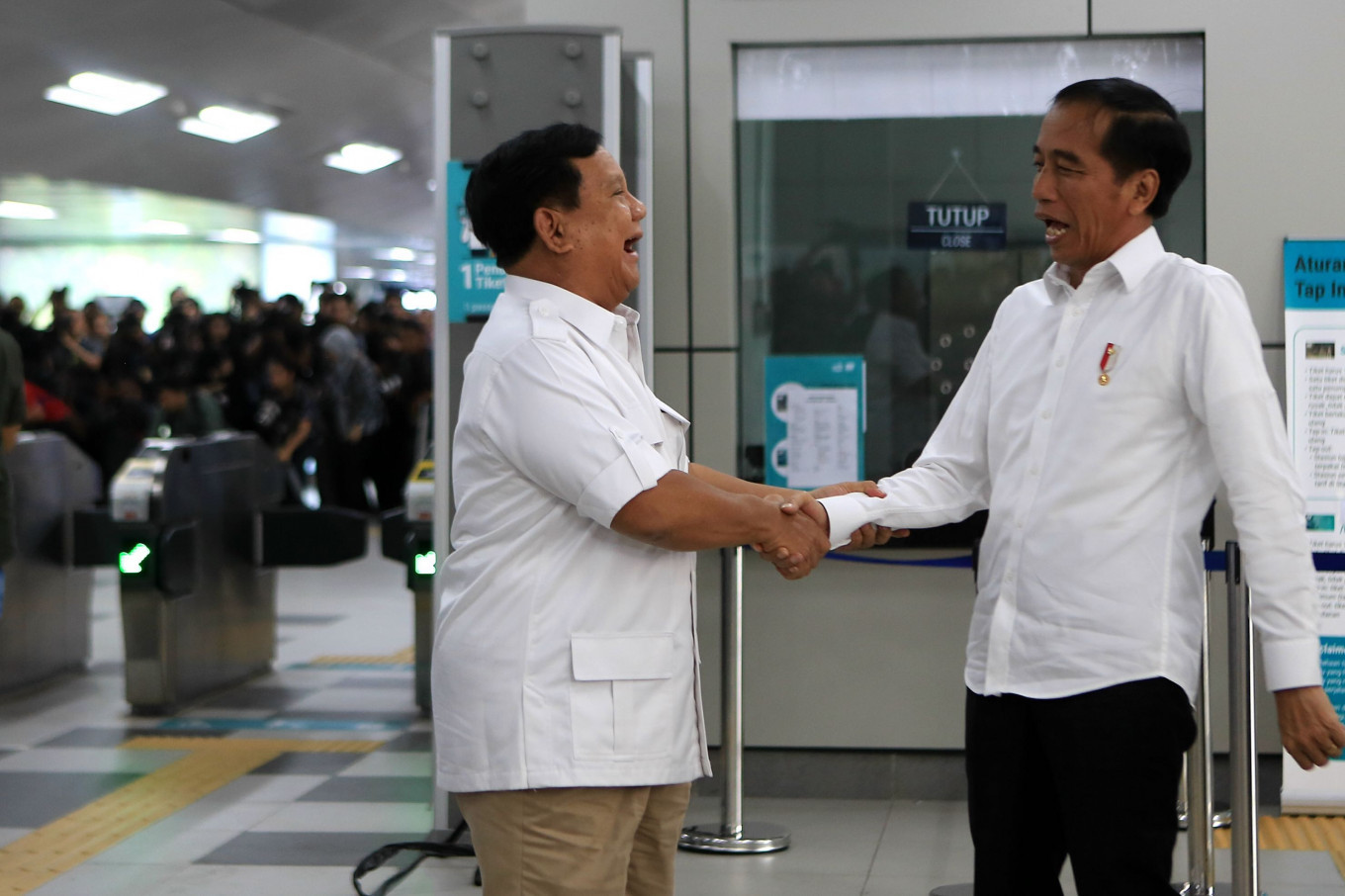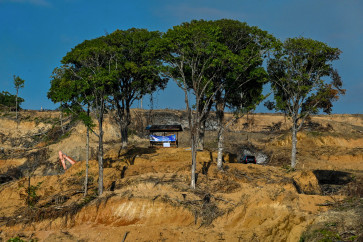Popular Reads
Top Results
Can't find what you're looking for?
View all search resultsPopular Reads
Top Results
Can't find what you're looking for?
View all search resultsWhat’s behind the ‘alliance’ between Jokowi and Prabowo?
The two erstwhile rivals have done a 180, forming a one-on-one alliance to serve each other's purpose heading into 2024.
Change text size
Gift Premium Articles
to Anyone
A
t a recent event, President Joko “Jokowi’ Widodo assigned Defense Minister Prabowo Subianto a new task: to coordinate the country’s intelligence agencies. Many have viewed the move as a clear sign of Jokowi giving his blessing as well as broad access to the country’s classified information to the Gerinda Party chairman, who was a sworn political rival only three years ago.
What does the President expect in exchange for this “generous” gesture?
We can read this as an indication that the two senior politicians are forming a new alliance to contest the 2024 general election. While Jokowi wants to use the remainder of his presidency to build his political dynasty by grooming his two sons and son-in-law for higher government positions, we can also be sure that he is preparing his post-presidency plan.
Prabowo has played down the “windfall” from the President, but his new role as intelligence coordinator means he will have direct access to the National Intelligence Agency (BIN), which is directly answerable to the country’s president, as well as others.
“BIN will not be under the authority of the Defense Ministry. The order from the President was that we will be a kind of coordinator, just to help him judge the merit of the information [gathered],” Prabowo said, as quoted by Antara News.
Prabowo can certainly use his new position to distinguish himself from potential rivals, such as former Jakarta governor Anies Baswedan, as well as woo Jokowi’s die-hard supporters. This will present a clear advantage, especially if Central Governor Ganjar Pranowo does not gain the backing of the Indonesian Democratic Party of Struggle (PDI-P), of which Jokowi is a member, as the President’s grassroots supporters will likely turn to Prabowo in such a scenario.
Prabowo returned the favor quickly enough. Contrary to the usual norm, in which the young pay a visit to their elders, last week he visited Jokowi's eldest son, Gibran Rakabuming Raka, the mayor of the Central Java city of Surakarta, the Widodo family’s hometown. During the visit, Prabowo openly expressed his support for Gibran, if the mayor decided to run as a gubernatorial candidate for either Jakarta or Central Java in the November 2024 regional election.
The parallel is obvious: Jokowi was Jakarta governor when he threw his hat into the ring for the 2014 presidential election. The odds are, however, that Gibran will run for Central Java governor because the Jakarta race could be uphill for him.
Two days later, Prabowo flew to North Sumatra to meet with Medan Mayor Bobby Nasution, the husband of Jokowi's daughter Kahiyang Ayu. There, he gave his blessing to Bobby to contest the North Sumatra gubernatorial election, praising Bobby’s achievements as mayor of the country’s third-largest city, despite the growing dissatisfaction in the city with Bobby’s leadership.
Meanwhile, Jokowi’s youngest son Kaesang Pangarep has decided to join politics, possibly aspiring to replace his brother as Surakarta mayor or to run as a legislative candidate under the PDI-P banner.
At the same time, the President seems to have grown more impatient with the PDI-P, which is still dragging its feet on the issue of nominating its presidential ticket. The party appears to be maintaining its stance to promote House of Representatives Speaker Puan Maharani in line with the demands of her mother Megawati Soekarnoputri, the party’s chairman and matron. The PDI-P elite seem to be desperately attempting to defend this strategy, although they are slowly coming to realize that it could torpedo the party’s prospects in 2024.
Jokowi has clearly shown his preference for Ganjar, a senior PDI-P cadre. Pollsters consistently rank Ganjar among the most popular potential candidates, alongside Prabowo and Anies. Megawati, who plans to announce her final picks by June after meeting with President Jokowi, would find it difficult to defy public opinion.
With that in mind, the PDI-P predictably criticized Jokowi's move to give Prabowo greater authority in intelligence gathering, arguing that it went against Law No. 17/2011 on state intelligence. Many in the party perceived the President had made a power move to punish the party for its reluctance to nominate Ganjar, as well as a sign of his opposition to Puan’s political ambitions.
“The law makes it very clear that BIN is the only agency in charge [of all intelligence activities],” said legislator T.B. Hasanuddin, a retired major general of the Indonesia Military (TNI).
Since 2016, BIN has been led by retired police general Budi Gunawan, who was Megawati’s aide during her presidency in 2001-2004, and the two have a strong personal relationship.
According to Article 9 of the State Intelligence Law, the institutions responsible for the country’s intelligence gathering are BIN, the separate intelligence units of the TNI, the National Police and the Attorney General’s Office, as well as a few ministerial and non-ministerial government agencies that are directly responsible to the president.
Article 39 of the law states that BIN is responsible for coordinating all intelligence agencies, harmonizing intelligence products, reporting on its intelligence coordination and management to the president, and regulating and coordinating national intelligence leaders.
Civil society organizations have slammed Jokowi for giving Prabowo intelligence access. This is partly because they are deeply suspicious of Prabowo, who was allegedly linked to several human rights violations in his role as a TNI Army general during the New Order era. They fear that Prabowo would use his new power to bury past records.
The allegations point to Prabowo’s involvement in several rights violations that occurred both before and after Soeharto’s resignation on May 21, 1998, including the forced disappearances of a number of pro-democracy activists. Prabowo, who was honorably discharged in 1998 as a three-star Army general, has denied the allegations.
On Jan. 11, President Jokowi officially acknowledged and expressed regret over 12 incidents of crime against humanity that occurred between 1965 and 2003, based on the findings of the Team of Non-Judicial Settlement of Past Gross Human Rights Violations, which he had set up.
While Prabowo spent most of his 2014 and 2019 presidential campaigns to attack Jokowi, heading into 2024, he is likely to use most of his time to win the hearts of Jokowi supporters.
One thing for sure is that Prabowo won't betray the President, though this unlikely alliance may prompt some of Jokowi’s supporters to switch their allegiance to Anies once his candidacy is finally made official.
Jokowi is certainly aware that Prabowo has reciprocated by personally delivering his blessings to the President’s two sons. Some may not like this, but this is realpolitik. The two have formed a strong alliance to serve each other's purpose.










